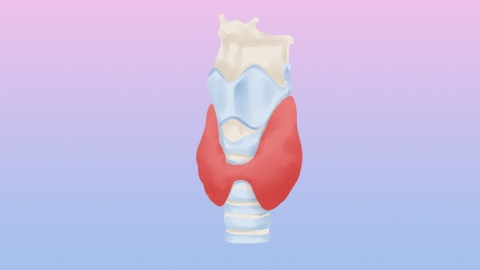What should I do if I have hypothyroidism?
Hypothyroidism generally refers to thyroid dysfunction characterized by reduced thyroid function. Under normal circumstances, hypothyroidism may be caused by improper iodine intake, aging, Hashimoto's thyroiditis, thyroid surgery, radioactive iodine treatment, and other factors. It is recommended to seek timely medical consultation, identify the underlying cause, and improve the condition through dietary adjustments, medication, and other methods under a doctor's guidance. Detailed explanations are as follows:

1. Improper iodine intake: Long-term excessive or insufficient iodine intake can affect thyroid hormone synthesis, leading to hypothyroidism accompanied by fatigue and cold intolerance. Adjust iodine intake, aiming for a daily intake of approximately 120 micrograms. Consume iodized salt in moderation and eat seaweed 1-2 times weekly, avoiding prolonged excessive intake of high-iodine foods or completely iodine-free diets.
2. Aging: After age 40, thyroid tissue gradually degenerates, resulting in reduced function and hormone secretion, making hypothyroidism more likely, often accompanied by slowed metabolism and weight gain. Regular thyroid function tests every 1-2 years are recommended, with prompt intervention if abnormalities are detected.
3. Hashimoto's thyroiditis: The immune system mistakenly attacks thyroid tissue, damaging thyroid follicles and reducing hormone production, leading to hypothyroidism, often accompanied by goiter and fatigue. Patients should follow medical advice to take hormone replacement medications such as levothyroxine sodium tablets, thyroid extract tablets, or enteric-coated levothyroxine sodium tablets.
4. Thyroid surgery: Partial or total thyroidectomy performed due to thyroid nodules, hyperthyroidism, or other conditions reduces thyroid tissue post-surgery, leading to insufficient hormone secretion and hypothyroidism, often accompanied by hoarseness and difficulty swallowing. Immediate hormone replacement therapy using levothyroxine sodium tablets, thyroid extract tablets, or enteric-coated levothyroxine sodium tablets should be initiated under medical supervision post-surgery.
5. Radioactive iodine therapy: Using radioactive iodine to destroy thyroid tissue in the treatment of hyperthyroidism may gradually lead to reduced thyroid function, causing hypothyroidism accompanied by cold intolerance and bradycardia. Regular thyroid function tests are necessary post-treatment, and hormone replacement therapy with levothyroxine sodium tablets, thyroid extract tablets, or enteric-coated levothyroxine sodium tablets should be initiated promptly under medical guidance if hypothyroidism develops.
In daily life, it is important to stay warm and avoid cold exposure to prevent worsening of cold intolerance. Increase intake of high-quality protein and dietary fiber to improve metabolism. Maintain regular sleep patterns, avoid staying up late, reduce the burden on thyroid function, and maintain stable thyroid function through comprehensive lifestyle adjustments to enhance quality of life.








